
The Business of Fashion
Agenda-setting intelligence, analysis and advice for the global fashion community.

Agenda-setting intelligence, analysis and advice for the global fashion community.
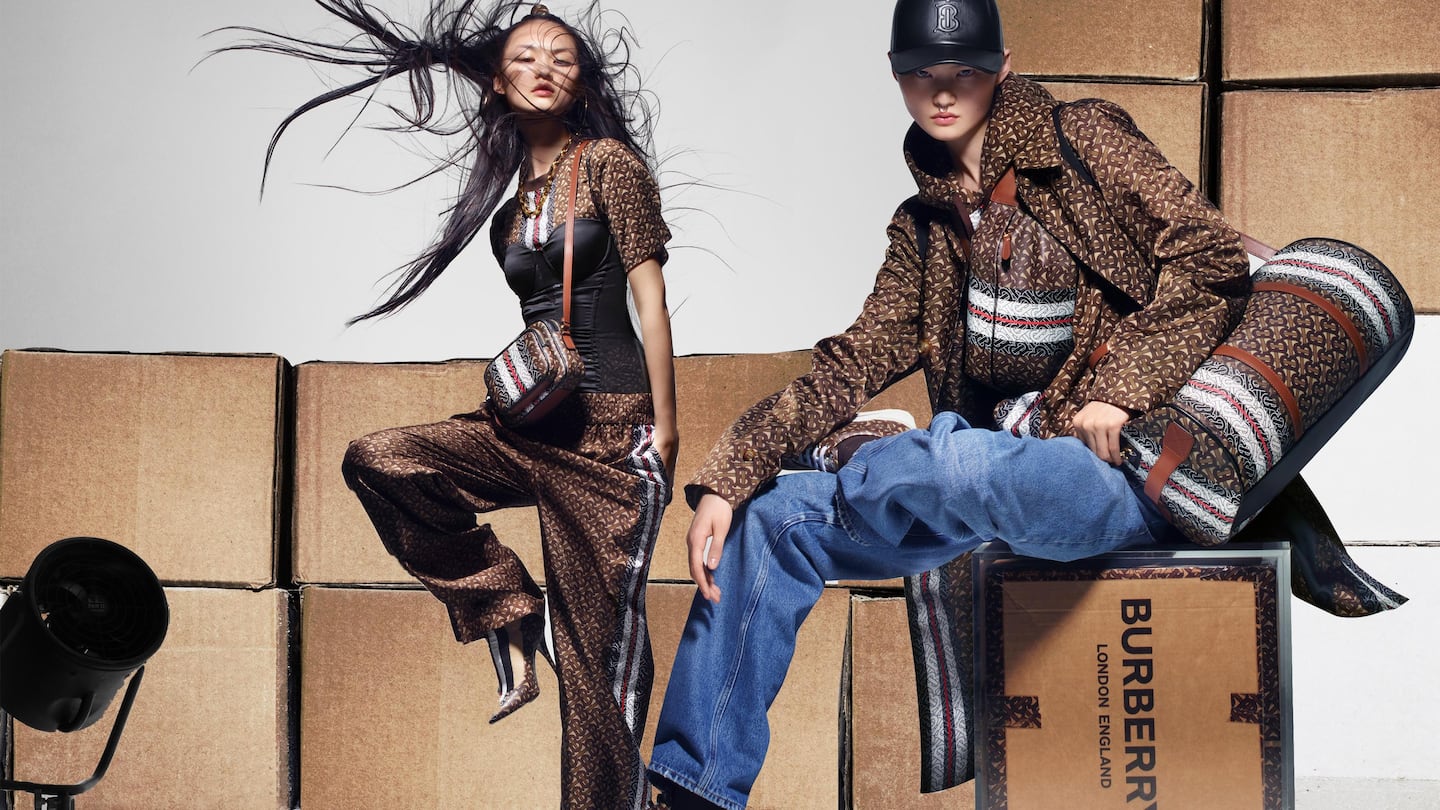
BEIJING, China — Chinese e-commerce giant JD.com saw sales of 201.5 billion yuan ($29.2 billion) during its 6.18 festival this year, which ran from June 1-18. The festival, which derives from the date Richard Liu founded the company in 2004, has ballooned into a phenomenon that luxury fashion brands and even e-commerce arch rival Alibaba can't escape.
6.18 is neither as well known outside China nor as lucrative as Alibaba’s Singles Day, also known as Double 11, which last year generated 213.6 billion yuan ($30.8 billion) in just 24 hours. Nevertheless, Alibaba’s Taobao and Tmall, e-tailer Suning, multi-brand luxury platform Secoo, countless fashion brands with online stores, and even offline retailers now have their own 6.18 promotions. All of them are leveraging the marketing hype around the event, just as JD and others have little choice but to participate in Singles Day.
“The more the merrier, online or offline,” says Kevin Jiang, President of International Business at JD Fashion and Lifestyle. “We see [widespread participation in 6.18] as a source of even more recognition of JD from Chinese consumers overall.”
“6.18 and Double 11 are the two biggest [Chinese shopping festivals], and that’s across all categories,” says Ching Xie, client partner at digital marketing agency Red Ant. “They’re great opportunities for fashion brands,” she says.
ADVERTISEMENT

Alibaba's 2018 Singles' Day event | Source: Courtesy
According to Ching, fashion brands tend to favour Tmall over JD, despite JD initiating the festival, because of JD's origins in consumer tech. "JD has taken a few important steps in recent years to launch fashion platforms and brands, but still it's not recognised to the level Tmall is," she says. In February Farfetch announced it would acquire the Toplife luxury fashion platform from JD, only two years after JD invested in Farfetch.
According to Alibaba, over 100 brands hit a new sales record at this year's 6.18 festival, surpassing figures from last year's Singles' Day festival. "Over 110 brands generated a GMV exceeding 100 million yuan ($14.48 million) during the 18-day campaign," a company spokesperson told BoF. Emporio Armani, Crocs, Nike, Adidas, L'Oréal and Lancôme were among them.
Mass market fashion brands on Alibaba’s Taobao and Tmall moved large volumes during the event, with Nike and Adidas each exceeding over 100 million yuan ($14.5 million) in sales in the first hour of June 1, and Nike hitting that mark in just four minutes. Victoria's Secret sold more than 43,000 items in 10 minutes and Converse sold more than 10,000 pairs of sneakers in fewer than five.
Alibaba wouldn't confirm total sales on its platforms over 6.18, but they say sales on Tmall Luxury Pavilion were more than double those during 6.18 in 2018. They also said the gross merchandise value across livestreams for the event exceeded 13 billion RMB ($1.9 billion).
“Whenever we know folks are in a shopping mood, we are there to offer them the best options and best deals,” said an Alibaba spokesperson. “Singles Day is our flagship event, while 6.18 serves as the midyear event catering to consumer demand in the first half the year.”
Whichever platform they’re on, fashion brands are making sure not to miss out.
“Four or five years ago brands asked should we participate in 6.18 or not,” says Pedro Yip, Partner, Retail and Consumer Goods, at management consultancy Oliver Wyman. “Two to three years ago they started asking how should we handle the volatility. Nobody wants to miss out on sales.”
ADVERTISEMENT
In China's shopping festival frenzies, the multiplier can go as high as 100-fold.
One of the chief hopes for brands participating in China’s sales festivals, which often requires operating at razor thin margins, is that they will win new customers who will return to buy full price items. To do so, Yip says, "a good customer relationship management plan is essential.”
For all their potential upside, China’s shopping festivals also pose challenges. Offline, promotions typically result in sales increases from double to quintuple the usual number, Yip claims, while in China’s shopping festival frenzies, the multiplier can go as high as 100-fold. Campaigns that exceed expectations create real challenges in terms of managing inventory and logistics, on top of the lost margins from consumers who would’ve paid full price.
“Being a winner can be a curse operationally,” Yip says.
Losing, of course, isn’t great either, with the potential for unsold stock to accumulate, a real problem for fashion brands hoping to keep pace with fast-changing trends.“Brands really need to understand their customers, their customers’ behaviour around such events, and the promotions their rivals are offering,” Yip says.
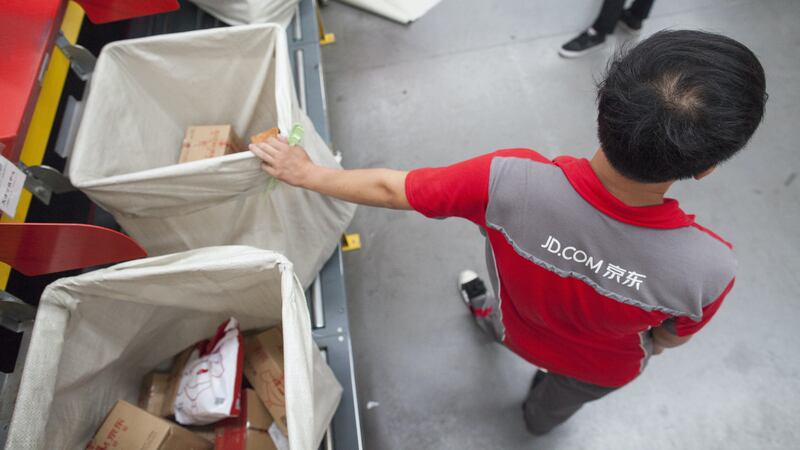
JD.com staff at a warehouse and distribution facility | Source: Shutterstock
One way to mitigate the risks around shopping festivals is to use pre-orders and protracted purchasing periods like the 18 days leading up to 6.18 to help brands anticipate demand. Big data insights from e-commerce platforms like Alibaba and JD.com can mitigate uncertainty, while working with JD’s logistics division, which they claim delivers 90 percent of orders same-day or next-day to 99 percent of China’s population, can help meet massive spikes in orders.
“Ahead of all major sales events, we use big data to predict what customers are going to buy from where so that we can put the inventory in the right place ahead of time,” says JD’s Jiang. “With initiatives like C2M [consumer-to-manufacturer production, where big data insights are used in the design of new products], the goal is to provide customers products they need before they even know they need them.”
Alibaba and JD both say they’re also using 6.18 to expand into rural markets and less developed cities, opening up new potential customers for fashion brands. To reach these markets, which Alibaba says are responsible for 70 percent of its 100 million new active users over the past year, the company is promoting live streams, which are especially popular outside top tier cities, and curating content on their app under bargain channels such as ‘Pianyihaohuo’ and ‘Juhuasuan’.
ADVERTISEMENT
For their part, JD claim they have captured most of China’s 300 million middle class consumers, and want to diversify their merchandise to reach customers outside the top tier cities. Transaction volume growth was twice as high in lower tier cities as the overall growth on JD.com during this year’s 6.18, the company says.
Transaction volume growth was twice as high in lower tier cities as the overall growth on JD.com during this year's 6.18.
In addition to consumer tech, fresh food and household essentials such as tampons and nappies, which are especially popular during the shopping festival, both mass market and luxury fashion brands are increasingly taking part in JD’s flagship event. JD announced, for example, a new partnership with Prada on June 17, which also saw Prada group brands Miu Miu and Car Shoe open stores on JD.com.
The same day, Omega launched a “virtual popup” on Tmall’s Luxury Pavilion, which also hosted a live stream emceed by actor Yu Menglong during 6.18 to promote Zegna, Moschino and Qeelin. Alibaba says all 113 brands on Tmall Luxury Pavilion took part in their 6.18 event.
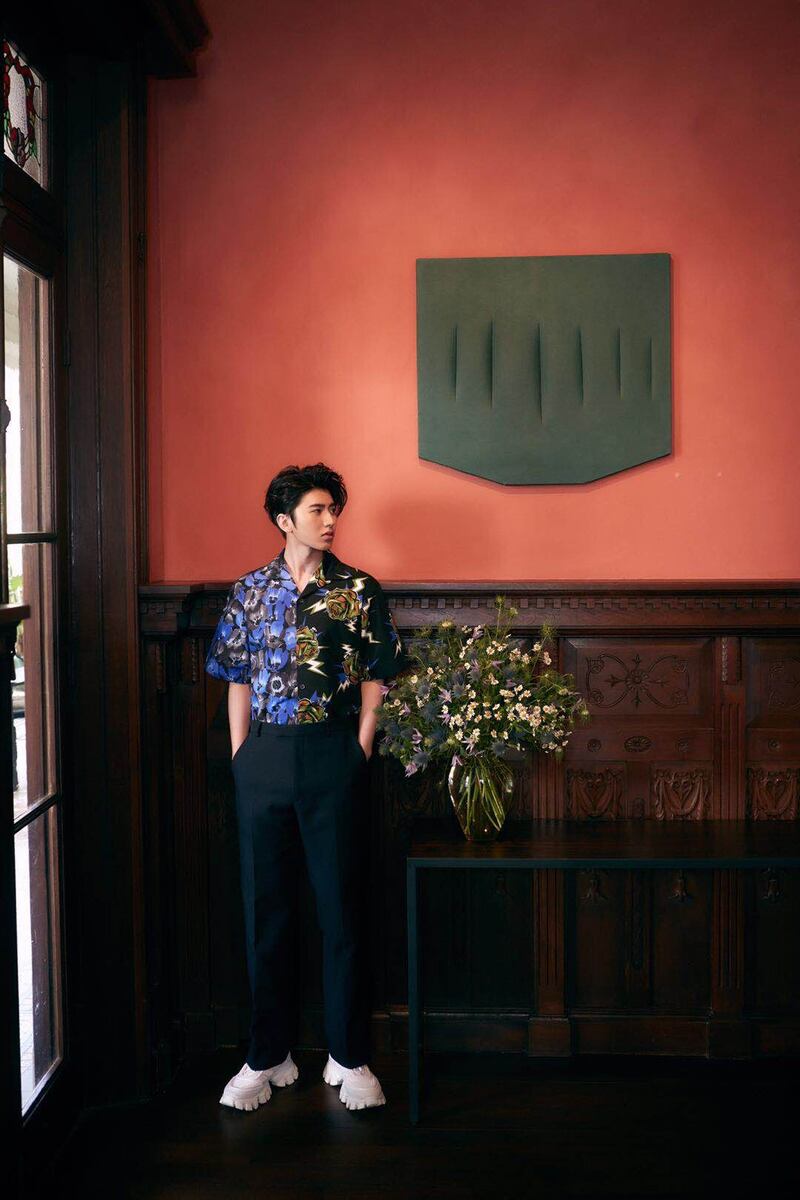
Chinese Prada ambassador Cai Xukun | Source: Courtesy
"Major brands under Tmall's Luxury Pavilion, the likes of Burberry, Valentino, Bottega Veneta, Tom Ford and Alexander McQueen among others, [participated] in the 6.18 online shopping festival [this year]", says Summer Xia, Research Analyst at Mintel China. "In fact, 6.18 is in line with the end of season sale for Spring/Summer collections, and in this light, luxury brands will leverage 6.18 to take care of their remaining stock."
Giving heavy discounts as part of a sales festival may be "off brand" for premium fashion labels, however, necessitating a more discreet approach, such as offering gifts or promoting new items.
“It is unlikely that we’ll see eye-catching promotional banners shouting about heavy discounts on their Tmall stores – and this is a strategy done to protect their brand image and reputation,” Xia explains.
“For some [brands], instead of overtly communicating their association with the 6.18 online shopping festival, they have positioned their promotions as an end of season sale. The majority of the banners seen by the other brands during this period still lean towards promoting the brands’ full-price or special edition items,” she says.
6.18 and Singles Day are just two of the many shopping festivals that have emerged in China over the past decade. There is also Double 12, Double 8, Valentine’s Day, Chinese Valentine’s Day, May 20 (because 5.20 sounds vaguely like the Chinese for ‘I love you’), Black Friday and Cyber Monday, despite China not celebrating Thanksgiving.
"There are so many shopping festivals now in China, almost one a month, that one of the biggest challenges for brands is the internal resources needed to support the campaigns," says Red Ant's Co-Founder and Asia CEO Elisa Harca.
Even shoppers have begun complaining that their shopping calendars are full.
“Consumers keep telling us that,” Yip says, “but when we look at the way they purchase, I don’t think we’ve got to that point yet.”
时尚与美容
FASHION & BEAUTY
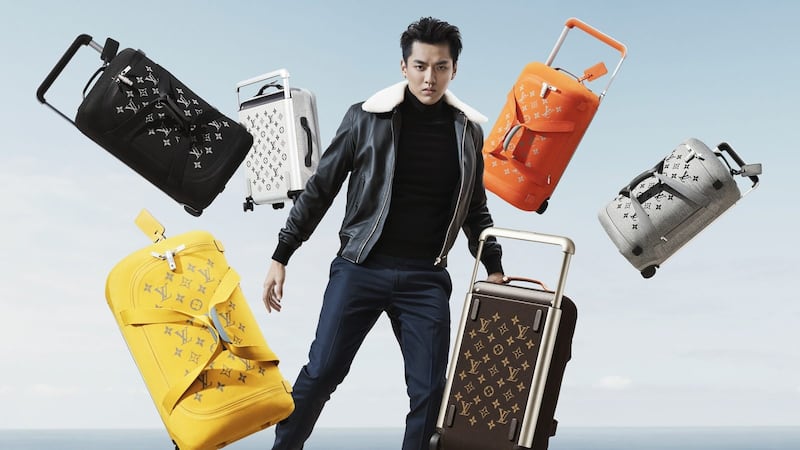
Louis Vuitton's campaign featuring actor and rapper Kris Wu | Source: Louis Vuitton
Louis Vuitton, Bulgari, and Cartier Dominate Digital in China
According to Gartner L2's latest Luxury China 2019 index — which ranks the digital performance of 86 luxury brands based on performances on platforms such as WeChat, Weibo, Tmall, JD.com, Baidu and Douyin — the three luxury brands won China's digital game. Standout initiatives included Louis Vuitton's sneaker "drops" launched via a WeChat Mini Program pop-up, Bulgari's utilisation of WeChat to support customer experience, and Cartier's engaging advertising pushes. According to the firm, brand-owned direct-to-consumer online stores and WeChat storefronts are luxury brands' preferred e-commerce channels (with adoption at 76 percent and 60 percent respectively for 2019) as they offer control over the customer shopping experience. (Gartner L2)
Eyeing IPO, Fosun Fashion Looks to Sell 700 Million Yuan in Shares
The fashion arm of Lanvin owner Fosun Group is reportedly looking to raise over $101 million through a Paris IPO. According to people with knowledge of the matter, Fosun is planning on selling a stake in its fashion unit to investors, and use the funds to revamp the business and boost profitability. The move is an advancement in Fosun's battle for Chinese luxury domination — since launching its brand management business earlier this year, the group is neck and neck with fellow serial fashion investor Shandong Ruyi, which hasn't been subtle about its ambitions to become China's LVMH. (Bloomberg)
DSquared Flaunts Poorly Timed Hong Kong Tribute
The same day that an estimated two million people took to the streets of Hong Kong to decry the local government's handling of earlier anti-extradition protests, DSquared launched its Spring/Summer 2020 collection at men's fashion week in Milan, which boasted a reference to Hong Kong and one of its recognisable faces, martial artist and actor Bruce Lee. Though coincidental, the timing of designers Dean and Dan Caten's East meets West was seen as unfortunate by some. (SCMP)
科技与创新
TECH & INNOVATION
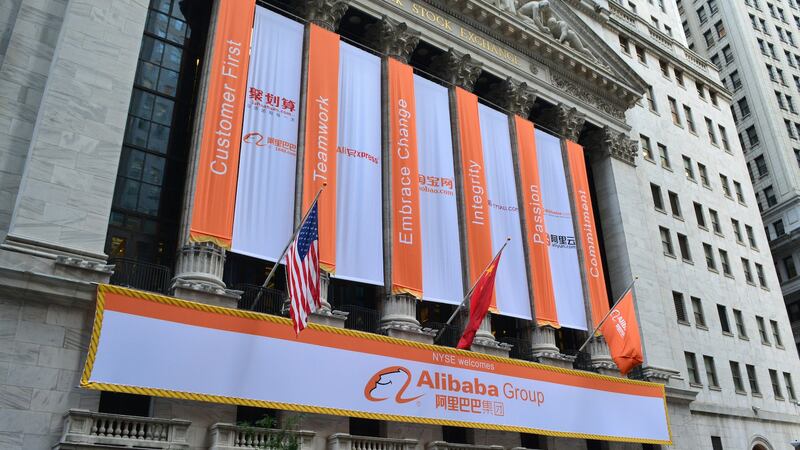
Alibaba on the New York Stock Exchange | Source: Shutterstock
Alibaba’s Homecoming IPO Could Be One of Many
The retail giant's $20 billion second listing in Hong Kong could pave the way for more IPOs in Hong Kong and the mainland. Amid unsettling relations between China and the US, experts reckon that the filing should create momentum for other Chinese firms gearing up for an IPO at home, which will be music to Beijing's ears. To bring home more tech IPOs, Beijing has recently established a new Nasdaq-style exchange in Shanghai with fewer regulatory hurdles for local players. However, the losses for the US could be enormous: there are currently 156 Chinese companies listed in the country, with a combined market capitalisation of $1.2 trillion. (Forbes)
Samsung’s Factory Closure Questions China’s Spot in Global Tech
Back in 2011, one in five smartphones sold in China was produced in Samsung's Huizhou factory. However, the complex — Samsung's last smartphone factory in China — has since been shuttered and layoffs are hitting headlines amid slowing smartphone sales, as the company shifts production to lower-cost hubs elsewhere. And as more tech players move production out of China amid the US-China trade war, many are wondering what it means for China's role in the global value chain. (Tech in Asia)
Forget “996,” Ant Financial Employees Are Working “10-12-6”
Following reports in recent months of Chinese tech workers' gruelling "996" schedules (nine AM– nine PM, six days a week), employees of Alibaba affiliate Ant Financial have alleged that their schedules are looking more like "10-12-6." In a now-deleted post on the professional networking platform Maimai, an anonymous employee complained that working hours were even worse than others had imagined. While some commentators berated the user for complaining, others said that their hours were perfectly bearable. But as China's tech sector continues to cool down and layoffs sweep the country's top firms, a healthy work-life balance is unlikely to be a priority on managers' to-do lists. (Technode)
消费与零售
CONSUMER & RETAIL
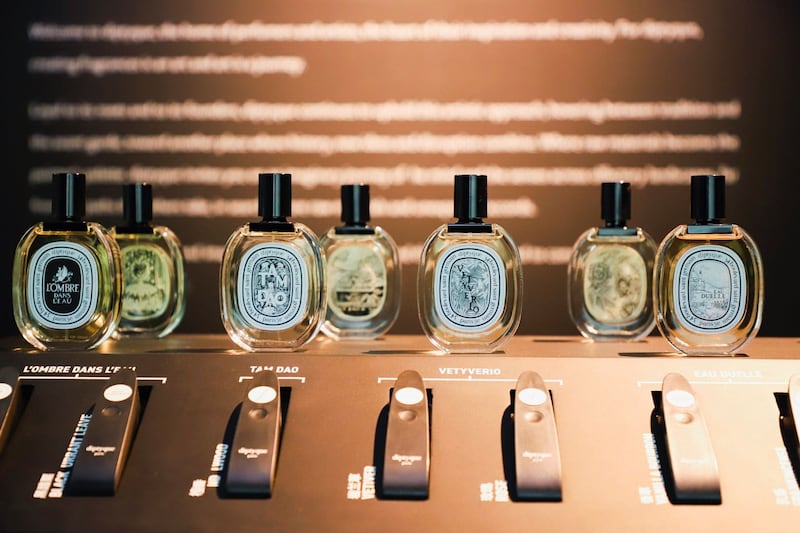
Diptyque | Source: Courtesy
In China, Niche Is the New Black
According to a new report from Reuter Intelligence, 60 percent of consumers based in top tiered cities such as Shanghai, Beijing and Guangzhou are "very curious" about niche brands. Though shoppers clearly associated bigger brands with trustworthiness and high quality, younger consumers in particular are becoming transfixed by smaller boutique companies. This surge in demand is attracting an influx of global companies — from Parisian Diptyque to American Obagi — to break into the increasingly crowded and competitive market. (SCMP)
Chinese Consumers Are Falling Out of Love with K-Beauty
China's beauty aficionados are increasingly opting for local brands over Korean ones. As a result, South Korean cosmetic exports to China rose just 20 percent to $1.3 billion in the first nine months of 2018, a sharp slowdown from the past five years' annual average of 66 percent growth. According to researchers, Chinese consumers are getting tired of K-beauty's uniform beauty standards and Chinese brands such as Herborist, Pechoin, Inoherb and Kans are reaping the rewards. (Inkstone)
Crocs to Curb China Production
To soften the blow of President Trump's latest round of tariffs, Crocs Inc. will reduce the volume of its products made in China for the US market by more than two-thirds over the next year. According to the company — which made $1.09 billion in sales last year and earned about $50.4 million — it will have to bear $5 million in costs over the next year, assuming Trump's 25 percent tariff takes effect in August. (Reuters)
政治、经济、社会
POLITICS, ECONOMY, SOCIETY
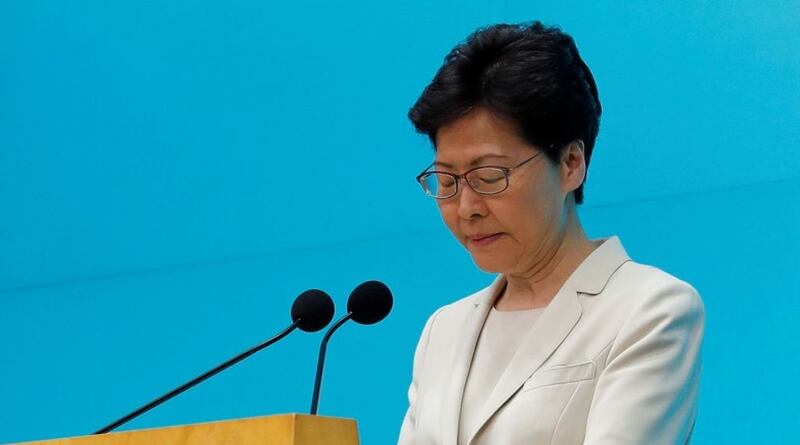
Carrie Lam apologising to the people of Hong Kong | Source: Reuters
Hong Kong Chief Carrie Lam Apologises to the Public
Lam has responded to calls for her resignation following weeks of unrest, as millions marched against proposals that would allow extradition to mainland China. On June 18, Lam offered her "most sincere apology to the people of Hong Kong" for the "controversies, disputes and anxieties" that arose as a result of the government's handling of protests, which resulted in injuries for both citizens and police officers. Though the bill has been suspended, Lam has neither resigned nor withdrawn it, but she said that its suspension is evidence that Hong Kongers' voices aren't going unheard. Meanwhile, the Chinese government has continued to stand behind the extradition bill and Lam throughout this month's unrest. (The Guardian)
In Shenzhen, Camera Found in Uniqlo Changing Room
On June 15, a female shopper found a camera hidden inside a changing room in Uniqlo's Shenzhen ICO mall location. Since then, a company spokesperson has stated that the camera was not put there by any company personnel, and that this has never occurred in the store's four years of operation. Netizens have since expressed their concern over privacy and images taken without their consent, and local police are continuing to investigate the matter. (Beijing News)
Local Tour Guide Blacklisted for Forced Shopping
A Guilin-based tour guide's license has been revoked after a video of her forcing her customers to spend money was posted online. The guide, surnamed Zhao, allegedly pressured tourists to spend over 20,000 yuan ($2,900) in local stores, and on June 1 was captured telling her clients that they had an hour to spend the amount and she would accept no excuses. The video has since gone viral, and Guilin's tourism bureau said on Tuesday it had revoked Zhao's license and ordered her to apologise to her customers. (SCMP)
China Decoded wants to hear from you. Send tips, suggestions, complaints and compliments to zoe.suen@businessoffashion.com.
With consumers tightening their belts in China, the battle between global fast fashion brands and local high street giants has intensified.
Investors are bracing for a steep slowdown in luxury sales when luxury companies report their first quarter results, reflecting lacklustre Chinese demand.
The French beauty giant’s two latest deals are part of a wider M&A push by global players to capture a larger slice of the China market, targeting buzzy high-end brands that offer products with distinctive Chinese elements.
Post-Covid spend by US tourists in Europe has surged past 2019 levels. Chinese travellers, by contrast, have largely favoured domestic and regional destinations like Hong Kong, Singapore and Japan.